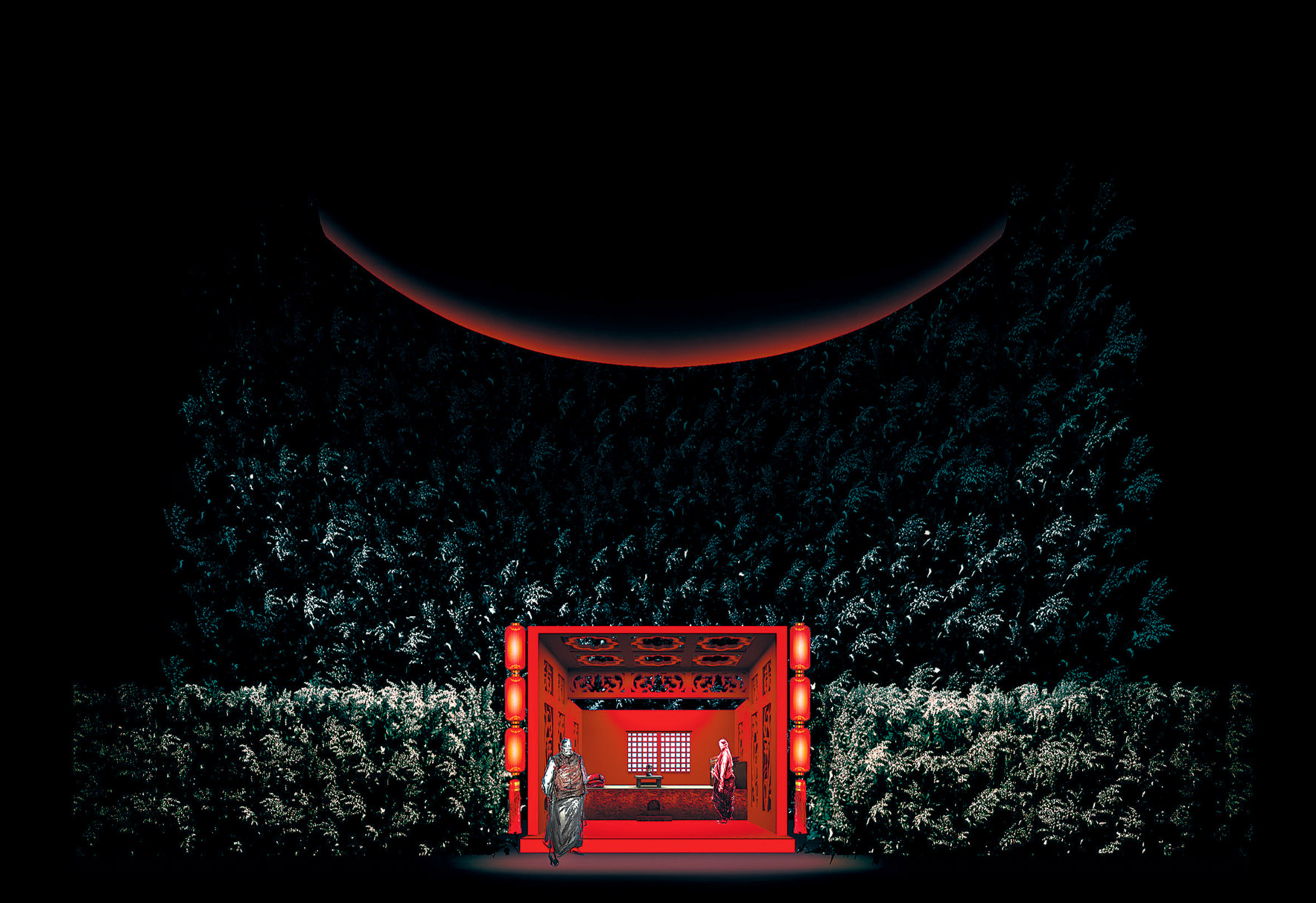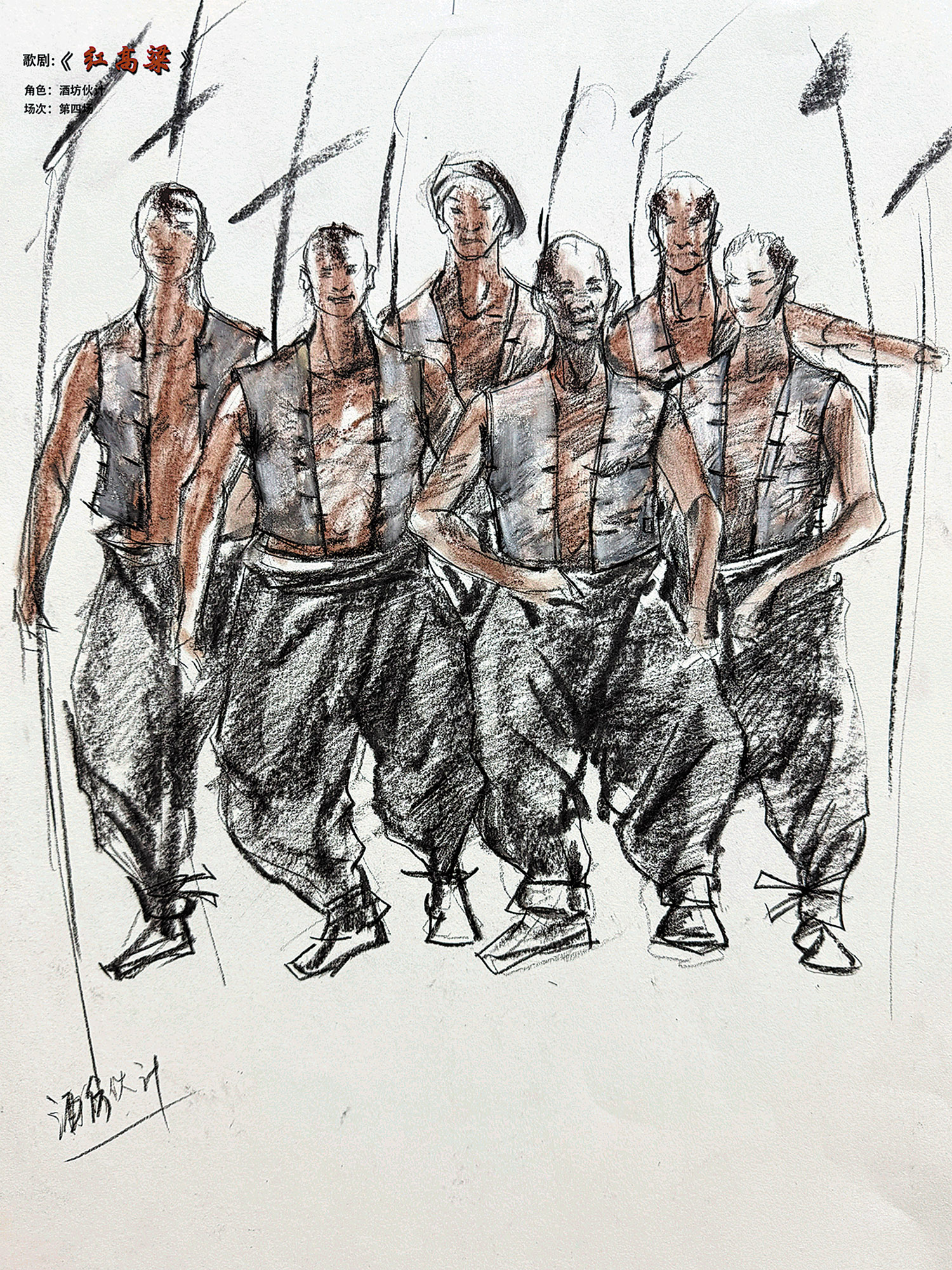Celebrated novelist plays scriptwriter for stage adaptation, bringing a powerful narrative of rural love to audiences with help from acclaimed conductor and theater artists, Chen Nan reports.

In a groundbreaking fusion of literature and music, the celebrated novel Red Sorghum by Nobel laureate Mo Yan is transformed into an ambitious Chinese opera of the same title, with Mo Yan taking on the scriptwriting and renowned composer Guo Wenjing bringing the music to life.
The Chinese opera, produced by the National Centre for the Performing Arts, will premiere in Beijing from Sept 27 to Oct 3.
This highly anticipated project is set to bring the iconic rural tale of love, war and resilience to new artistic heights by blending the powerful narrative with the grandeur and artistry of Chinese opera, says Zhang Yao, vice-president of the NCPA.
Zhang notes that the opera will debut shortly after China celebrates the 80th anniversary of victory in the Chinese People's War of Resistance Against Japanese Aggression (1931-45) and the World Anti-Fascist War.
READ MORE: Performer hits heights of excellence
First published in 1986, the novel remains one of Mo Yan's most renowned works. It captures the struggles and triumphs of the Chinese people during the War of Resistance through the lens of an epic love story set in rural China.
The novel's vivid imagery, symbolic use of red sorghum fields, and raw portrayal of human suffering and survival deeply resonate with readers worldwide. The 1987 film adaptation by Zhang Yimou further cemented its cultural significance and introduced Mo Yan's writing to a global audience. It won major international awards, including the Golden Bear award at the 38th Berlin International Film Festival.
"When I wrote this novel in 1985, it was the 40th anniversary of the victory in the war against Japanese aggression. At that time, I was still a young student," recalls Mo Yan, saying that back then, with the vigor of a young man, he poured his "passionate blood" into the pen, drawing a vivid picture of the red sorghum fields.
Mo Yan, who did not personally experience the war, chose instead to avoid grand narratives and direct depictions of the battlefield and approached the story from the perspective of the common people.
"I believed that in Red Sorghum, besides the major characters Jiu'er and Yu Zhan'ao, there was another more important 'character' — the sorghum itself. In my writing, the sorghum is 'conscious and soulful', symbolizing a primal and resilient vitality. It also becomes the spiritual totem of the Chinese people, who fought with blood and courage in pursuit of national liberation and freedom," says Mo Yan.
Speaking about the opera adaptation, Mo Yan says that over the decades, the literary work has been adapted into films, TV dramas and dance dramas but there has never been an operatic version.
He felt that the birth of Red Sorghum's opera version "seemed to be waiting for the right moment and the right people". Thus, he decided to take on the role of writing its script.

However, being unfamiliar with the creation of opera, Mo Yan initially followed the route of adapting traditional Chinese opera — he started from scratch, which proved to be challenging, even for the literary master.
At that moment, Mo Yan came across an oil painting portraying the scene of red sorghum in the snow. Seeing the white snow falling on the sorghum pinnacles, he felt inspired. Images of red sorghum under different circumstances, such as in fire, in the rain, in the wind, and even soaked in blood, passed through his mind. These rich images poetically elevated the script.
"The narrative logic of a novel and that of an opera are completely different. Novels unfold through details and characters, while opera relies on music to carry emotion," Mo Yan says.
After reading many classic opera librettos, he realized that he had to write the opera script as though writing poetry. Eventually, the Red Sorghum opera script went through seven drafts before it was finalized.
The core characters and major plot points from the original novel were retained, with the storyline becoming more concise and the lyrics vivid and expressive, reflecting distinct regional features and character traits. Mo Yan described the process as "both painful and joyful".
Mo Yan collaborated with composer Guo for this opera, taking Guo and other creative members to his hometown in Gaomi county, Shandong province. Mo Yan says that his hometown has nourished his spiritual world.
According to Guo, who is known for his compositions in symphonic music, operas, and chamber music, he listened to Shandong's folk music and traditional operas, and brought several large boxes of music scores, records, and research materials back to Beijing.
He immersed himself in the local music of Shandong, which he then adapted for the stage.
"The story of Red Sorghum is grand and majestic, so the overall musical style leans toward strength and robustness," Guo says.
He incorporated local styles such as Shandong Bangzi, Jiaozhou Yangge, and Gaomi folk songs into the score, adding traditional Chinese musical instruments, such as the suona (a double-reed woodwind instrument) and banhu (a bowed string instrument) to the orchestral arrangements. The combination of these regional elements with the techniques of grand opera creates a musical language that is symphonic and dramatic.
ALSO READ: Nobel laureate Mo Yan publishes new drama Crocodile
"Every character in the novel is vivid, so I designed music tailored to each character's personality, striving for the audience to recognize them instantly just through the music," Guo notes. "Music can push emotions to their extreme, like nuclear fission, causing the characters' emotions to explode."
The opera will be conducted by Lyu Jia, the music director of the NCPA, with the China NCPA Orchestra and its chorus. In Red Sorghum, the character Jiu'er represents the awakening and struggle of Chinese women in the 20th century. She is a striking symbol of wild vitality breaking free from the war's feudal shackles, a role which will be performed by renowned soprano Song Yuanming and rising soprano star Wu Liere.
The role of Yu Zhan'ao, the bandit hero, will be played by tenors Guo Zizhao and Wang Chong, who will vividly shape his rebellious personality.
Contact the writer at chennan@chinadaily.com.cn


